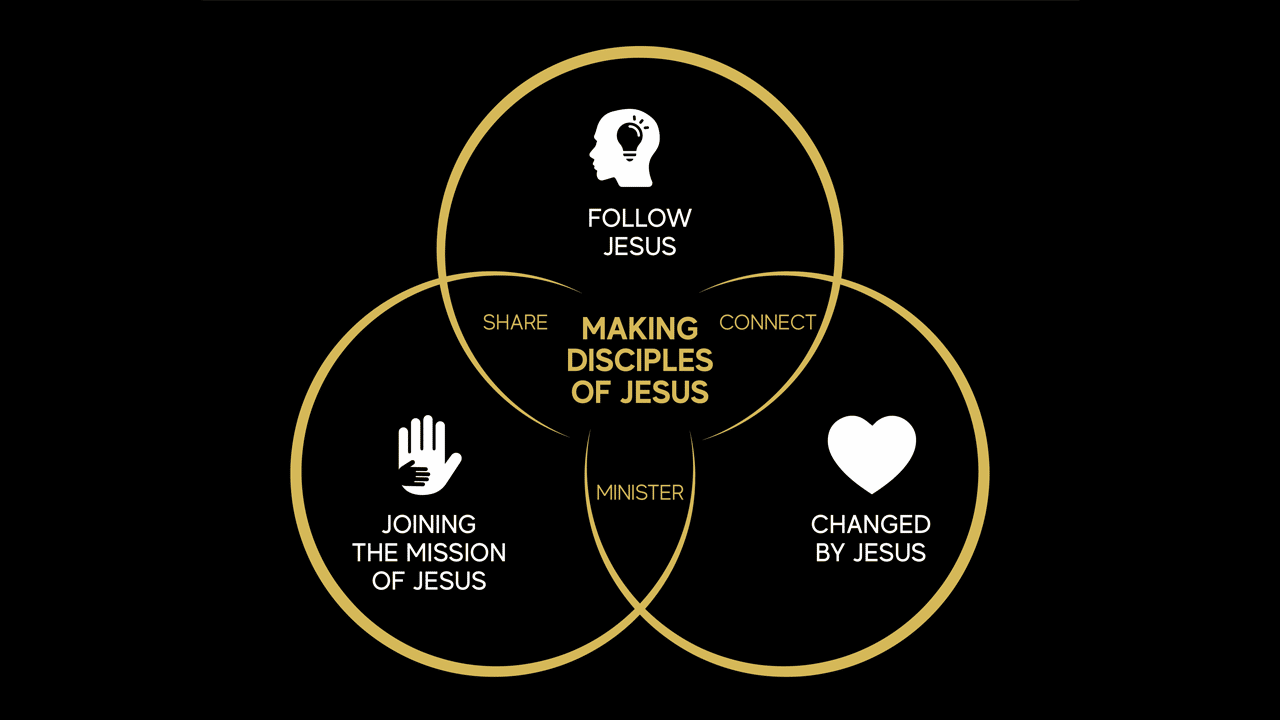What is a Disciple? Three Key Characteristics

We are called by God to be disciples of Jesus. And the core mission of the church is to make disciples. So the most fundamental question is, “What is a Disciple of Jesus?” At Discipleship.org we recommend the following simple answer:
A disciple of Jesus is someone who is following Jesus, being changed by Jesus, and is committed to the mission of Jesus.
We find Mark 1:17 (Matthew 4:19) to be a helpful verse that can serve as a useful framework around which we can place the teachings of the New Testament on what it means to be a disciple.
“And Jesus said to them, “Follow me, and I will make you become fishers of men.” (ESV)
Notice the three key characteristics of a disciple:
- He/she follows Jesus
- He/she is being changed by Jesus
- He/she is committed to the mission of Jesus
The diagram at the beginning of this post is a simple way that we sometimes picture how people grow as disciples:
- Head – in the mind the decision to follow Jesus has been made (now he/she needs to connect in discipling relationships)
- Heart – in discipling relationships we are changed by the Spirit to be more and more like Jesus (now he/she needs to minister to others)
- Hand – by our actions we actively committed to the mission of Jesus (now he/she needs to share the gospel and disciple others)
Scott Sager joined with me to write the short book, Disciple Making: The Core Mission of the Church and the following is the excerpted first chapter of that book.
—–
I (Bobby) became friends with Larry as we watched our sons play hockey together. Larry happily accepted my invitation to join a Bible discussion group. Through this discussion group, it became clear Larry knew nothing about the Bible. Growing up in a rough New York Community, he had experienced trauma at the early age of twelve, when he saw a member of the mafia kill his father. It so traumatized him that he spent the next thirty-plus years of his life keeping himself far from conversations about death—and ultimately about God. Yet because of this new friendship, he was getting into the Bible, and learning a lot too.
One day, Larry described to a co-worker what he was learning about the Bible. In response, the man questioned and challenged Larry’s new realizations about God, Jesus, and the Bible. Returning to our Bible study confused and seeking clarity, Larry wanted to be sure this new path would be worth it.
“Bottom line,” he asked me, “What is it all about?” He wanted to know the point of life and how Jesus fit in. People have always asked questions like this in various ways: Why am I here? What is God’s purpose for my life? Where is my life going? How does it all end? These were probably the same questions Adam and Eve had asked God during their daily visits in the Garden of Eden, and people are still seeking answers to them in our day.
I gave Larry a quick answer: “God wants a relationship with you, in which you trust and follow Jesus.” This bottom-line, one-sentence response didn’t include a warning about hell (although I was concerned about that for him), or the reality of life after death in general (even though that is important), or that he would need to follow the teachings of the Bible (which developing a relationship with God requires). There was time for those things. I was trying to disciple Larry the way Jesus discipled people—through relationship. He needed to know, bottom line, what it was all about, and I told him it’s all about trusting and following Jesus. It was a short, uncomplicated way to tell him God wanted him to become a disciple of Jesus. That is what God wants of all people. He wants everyone in the world—of “every nation, tribe, people and language” (Revelation 7:9) to become a disciple of Jesus Christ.
So, what is a disciple?
A Biblical Definition of a “Disciple”
Linguistically, the word for “disciple” in the Greek is mathetes, and, although we translate it “disciple,” it also means learner, student, or follower. This word is most akin to the environment of an internship where an expert apprentices a student toward competency in a trade or skill. This relationship involves head knowledge but focuses upon applying that knowledge to everyday situations of life to equip the learner with wisdom. The hope is that the apprentice in a trade will be the master-teacher of others in years to come.
In addition to the linguistic route, we could also answer the question, “What is a disciple?” by looking at the descriptions of disciples of Jesus found in the New Testament. Taking our cue from various Bible passages, we discover a disciple is someone who:
- Trusts Jesus so much they pledge their full allegiance (called “faith”) in Him,
- Imitates Jesus’ life completely as both their teacher and lord,
- Looks to Jesus’ teachings as the basis of moral decision making ,
- Loves Jesus so much that love spills over into every other relationship as well, and
- Forms their life around Jesus Christ.
Does that feel overwhelming? Don’t lose heart. Instead, slow down and return to the simple-yet-radical call of Jesus to follow Him. Those of us who regularly help churches learn to focus on disciple making have learned that people need a practical, specific, and memorable definition of a disciple.
We offer here a definition of a disciple that makes sense of (and room for) all the important descriptions of kingdom living we just listed. It’s based in Jesus’ invitation to Peter and Andrew:
And Jesus said to them, “Follow me, and I will make you become fishers of men. (Mark 1:17, ESV)
In this single verse, we find three elements of what it means to be a disciple:
- Following Jesus (“Follow me”)
- Being changed by Jesus (“and I will make you become”)
- Joining Jesus’ mission (“fishers of men”)
This framework is the basis by which thousands of church leaders working with Discipleship.org and .org Network have adopted the following definition of a disciple:
A disciple is someone who is following Jesus, being changed by Jesus, and is committed to the mission of Jesus.[1]
Mark did not include Mark 1:17 for the purpose of defining a disciple, but it serves as a helpful framework for understanding what it means to be a disciple. Everything the New Testament teaches about being a disciple can be categorized under these three elements.[2]
Following Jesus. First, a disciple is someone who “follows Jesus.” Read through the New Testament and you will find the word “Christian” used only 3 times. Look for the word “disciple,” though, and it shows up 296 times in the NIV. This means the English word “disciple” shows up 99 times more often than the word “Christian.” While some people today might read Jesus’ command to follow Him in Mark 1:17 and Matthew 28:18-20 and assume it to be only for the Twelve and not for modern-day believers, that is simply a false narrative. Jesus’ Great Commission doesn’t end with a person’s baptism but continues with the commitment to “obey everything” Jesus commanded (Matthew 28:20a), which includes the command to make disciples. In this way, Jesus’ original call extends to everyone to follow Jesus as His lifelong learner—to the very end of the age—and to also become a disciple maker.
Being changed by Jesus. Second, as we follow Jesus, we change. The New Testament promises that, as we pursue God’s glory, the Holy Spirit transforms us into His image (2 Corinthians 3:18). When Jesus told Peter and Andrew, “I will make you become” (Mark 1:17, ESV), He was promising core transformation. And as we read the disciples’ stories, that’s precisely what we see.
For example, take James and John who left their father, the nets and the hired hands to follow Jesus. What kind of character did these men have when Jesus called them? Mark’s Gospel tells us Jesus gave them a nickname: “Sons of Thunder” (Mark 3:17). This means that their father, Zebeddee was a hot-head or that they were hot-heads, or both. We discover that James and John had a dark-streak inside them that wanted to destroy their enemies.
Their anger and rage boiled to the surface one day in a region called Samaria, a region of half-Jews who hated the Jews as much as the Jews hated them. When the Samaritans snubbed Jesus and His band of apostles, James and John’s anger boiled over and they asked Jesus, “Do you want us to call down fire from heaven and destroy them all?” (Luke 9:54). Jesus rebuked them for their suggestion, but did not exclude them from the group. In today’s “cancel culture,” James and John would have been shamed, shunned, and shuttled out the door for their inbuilt dislike of Samaritans. Instead of canceling them, Jesus saw that the two brothers needed more training from Him and pulled them closer and strove even more to impress on them His God-life. Amazingly, by the end of his life, the elderly John was known not as a “Son of Thunder,” but as the “Apostle of Love,” having referenced love in his Gospel and first letter (1 John) more than in any other New Testament writer. Our world tells us, “People don’t change,” and although that may be true, when people follow Jesus, Jesus changes them.
Joining Jesus’ mission. Third, the change Jesus works into our lives leads us to model our entire lives after Jesus, which includes our commitment to join Him and “fish for people.” In this, we learn to make disciples as Jesus made disciples. After all, if we obey everything Jesus commanded, that means we too will learn to replicate the process by which we became His disciples. To be a mature disciple of Jesus is to become a disciple maker like Jesus as well. It is a natural process: we follow Jesus, we are changed by Jesus, and—as we follow the one who spent of His time making disciples—we too commit to make disciples as He did.[3] Loving people as Jesus loved people through service means that we want to see people come to faith in Jesus and embrace God’s kingdom rule in their lives (John 13:34). Because we love people and want God’s best for them, we want to help them become disciples and grow as disciples.
With our definition of a disciple in mind, with its three elements, a follow-up question is in order. Every one of us should ponder the question, Am I a disciple of Jesus? Answering this question calls for more deliberation than “Where do I go to church?” or, “When did I get saved?” Whether or not you are a disciple of Jesus has strong implications for how you live today, not just for a decision made years ago.
Is Being a Disciple Optional?
In Scripture, the concept of being a disciple is not an add-on to conversion; it is part of conversion. An adage says, “What you win them with is what you win them to,” and if people are won over only to the obvious benefits of salvation—say, forgiveness of sins and an eternity in heaven—then we cannot expect them to become the kind of disciples who “deny themselves and take up their cross daily and follow [Jesus]” (Luke 9:23). We must, therefore, be clear and upfront about the call to become a disciple: the Word of God teaches that the decision to receive Christ’s salvation is also a decision to follow the path of discipleship found in the Bible.
Consider the following analogy: Whenever a newborn enters this world, immediately upon arrival, a nurse administers a simple health test called the “Apgar”—assessing the new baby’s health with five basic criteria. A nurse will check the newborn’s color, heart rate, reflexes, muscle tone, and respiration. They conduct this test not because a healthy birth is the end goal of every child or parent but because a healthy birth is only the beginning of their life—and they need to ensure the baby begins well. A healthy birth is the best indicator of a healthy life to follow.
A spiritual birth is the same: When a person makes the decision to fully embrace Jesus as both Savior and King, they enter into a spiritual new birth best seen as the coming together of five elements: faith, repentance, baptism, the reception of the Holy Spirit, and the forgiveness of sins. When these five elements come together into one single decision, together they become a fierce commitment to live for Jesus. Just as with the Apgar test at physical birth, having all five fully functioning in new spiritual birth makes for the healthiest of outcomes.
The Apostle Paul describes our new birth with a focus on water baptism this :
Or don’t you know that all of us who were baptized into Christ Jesus were baptized into his death? We were therefore buried with him through baptism into death in order that, just as Christ was raised from the dead through the glory of the Father, we too may live a new life.…In the same way, count yourselves dead to sin but alive to God in Christ Jesus. (Romans 6:3–6, 11)
Baptism imitates the death, burial, and resurrection of Jesus: the person’s old self dies and is buried, and the person rises up from the waters committed to a “new life.” In that new life, they learn what it means to be dead to sin and “alive to God in Christ Jesus.”
But here’s our main point: baptism no more serves as the ultimate moment of the Christian life than the Apgar test serves as the ultimate moment of a person’s human existence—it is only the start of new life! A healthy spiritual birth launches the follower of Jesus fully and freely into the life of a disciple. Faith gives them wings to fly, repentance removes the hindrances of flight, baptism is the moment of leaving the nest, the Holy Spirit allows the believer to spread wings, and with the commitment to soar into the life intended for them—the rich life of a disciple of Jesus.
You can access the short book by Bobby Harrington and Scott Sager out of which this post is drawn from Amazon.com – Disciple Making: The Core Mission of the Church.
[1] For more information on this definition and how to use it, see Jim Putman, Bobby Harrington, and Robert Colemans’s book DiscipleShift: Five Shifts to Help You Make Disciples Who Make Disciples (Grand Rapids: Zondervan, 2013).
[2] For more information, see Bobby Harrington and Josh Patrick, The Disciple Makers Handbook: Seven Elements of a Discipleship Lifestyle (Grand Rapids: Zondervan, 2017)
[3] The exact percentage of time that Jesus spent focused on discipling the twelve is hard to peg, but this is commonly quoted. Dave Ferguson quotes 73% as a good number – see The 5 Essential Practices of Leaders Who multiply Leaders.
If you have enjoyed reading this, please consider joining our email list!











